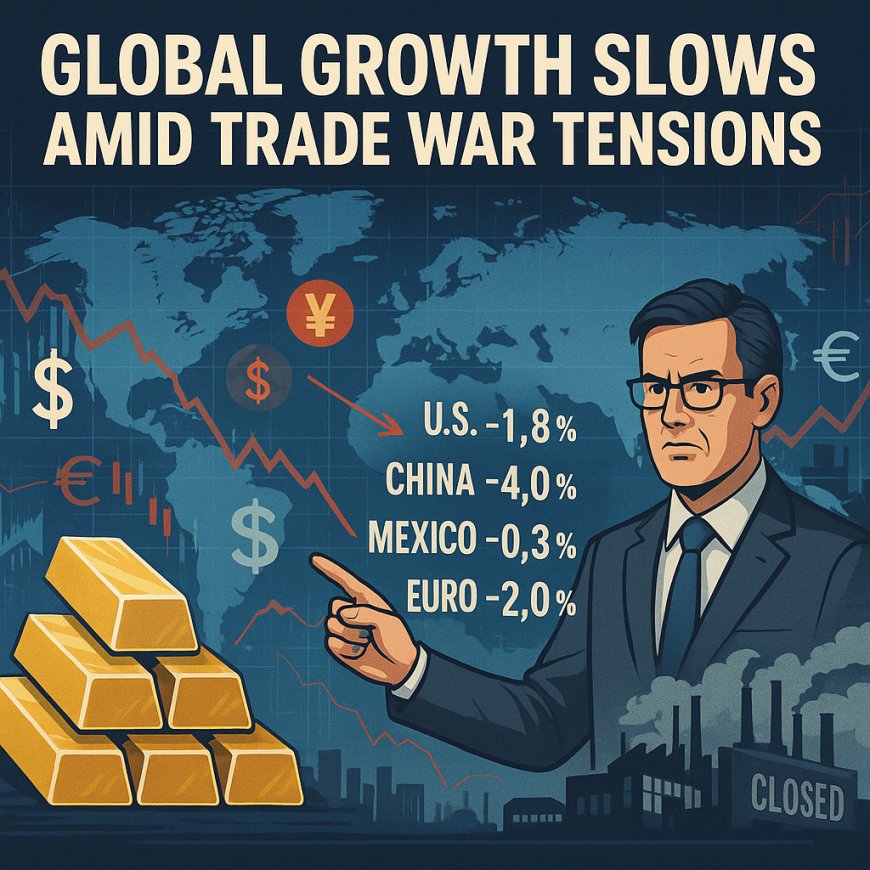IMF Warns Global Growth Will Slow as Trade War Intensifies
The IMF forecasts a global economic slowdown amid escalating trade wars, with significant impacts on the US, China, Mexico, and the Eurozone. Read the full analysis.

A Global Economy Under Pressure
The International Monetary Fund (IMF) has issued a sobering forecast for the global economy in its latest report, predicting a sharp slowdown in growth for 2025. The primary culprit: an escalating trade war, predominantly between the United States and China, which has sent ripples through neighboring economies and major markets worldwide.
According to the IMF, the global economy is expected to grow by just 2.8% in 2025, a significant downgrade from the 3.3% recorded in 2024, and far below the historical average of around 3.8%. While a global recession is not the baseline scenario, the Fund warns that the risk of one has increased markedly, with uncertainty clouding the economic outlook.
Key Downgrades: United States, China, and Mexico Take the Hardest Hits
The United States: Facing Consequences of Its Own Policies
The IMF has cut its growth forecast for the United States to 1.8% for 2025, down nearly a full percentage point. This downgrade reflects the impact of aggressive tariffs imposed by the administration of President Donald Trump, which have strained trade relations and increased costs for American businesses and consumers alike.
“The U.S. is one of the largest casualties of its protectionist trade policy,” noted IMF Chief Economist Pierre-Olivier Gourinchas. While the country entered 2024 from a position of relative strength, the Fund now estimates the probability of a U.S. recession has risen from 25% to 40% over the next year.
China: Growth Forecast Slashed to Historic Lows
China, the epicenter of the trade conflict, is also facing mounting challenges. The IMF revised down its growth outlook for the world’s second-largest economy to just 4%, the lowest since 1990. The Fund attributes this decline not only to the ongoing trade war with the U.S. but also to domestic economic weaknesses and tightening financial conditions.
“The pressure from tariffs has compounded structural issues within China’s economy, limiting its ability to rebound in the short term,” the report states.
Mexico and Latin America: Regional Repercussions
The effects of the trade war extend beyond the two superpowers. Mexico, closely tied to the U.S. economy, is projected to see a contraction of 0.3% in 2025, a sharp reversal from its earlier growth forecast of 1.7%. This marks a significant blow to Latin America’s second-largest economy.
Across Latin America, growth is expected to slow from 2.4% in 2024 to 2.0% in 2025, driven by falling investments and financial tightening exacerbated by trade tensions and uncertainty.
The Eurozone: Stagnation on the Horizon
In Europe, the IMF revised its growth forecast for the eurozone downward by 0.2 percentage points. While less severe than other regions, the slowdown highlights the continent's vulnerability to external shocks. Germany, Europe’s largest economy, is forecast to register zero growth in 2025, as both export demand and industrial production falter.
France, Italy, and the UK also saw cuts to their growth forecasts, with Spain being the lone bright spot. The IMF upgraded Spain’s GDP growth to 2.5%, buoyed by resilient domestic consumption and tourism.
Commodity Markets: Gold Soars as Investors Seek Safe Havens
The global economic uncertainty has fueled a surge in demand for safe-haven assets, with gold prices hitting a historic high of nearly $3,500 per ounce. The IMF attributed this spike to investor concerns over erratic economic policies and geopolitical instability.
One factor behind the surge was President Trump’s renewed public attack on Federal Reserve Chairman Jerome Powell, demanding interest rate cuts that Powell has resisted to avoid exacerbating inflationary pressures.
Geopolitical Dynamics: Brazil and Chile Pursue Regional Integration
Amid the global upheaval, some nations are seeking new avenues for growth. Brazilian President Luiz Inácio Lula da Silva and Chilean President Gabriel Boric recently signed a series of agreements aimed at deepening commercial ties and advancing the bi-oceanic corridor project, a massive infrastructure initiative designed to link South America’s Atlantic and Pacific coasts via roadways across Brazil, Paraguay, Argentina, and Chile.
China has expressed interest in investing in the project, further complicating the geopolitical landscape as Washington seeks to isolate Beijing economically. The IMF cautions that such regional initiatives could reshape trade flows in the coming years.
Corporate Fallout: Tesla Earnings Plunge
The trade war’s repercussions have not spared multinational corporations. Tesla reported a 71% drop in net income for the first quarter of 2025, citing a 13% fall in vehicle sales and a 20% drop in automotive revenue. Analysts attribute the decline partly to the reputational damage CEO Elon Musk has sustained since joining the Trump administration as head of a controversial new government agency.
The IMF warned that corporate profits in several sectors — including technology and automotive — are likely to remain volatile as trade restrictions persist.
A Precarious Path Ahead
The IMF’s latest report paints a picture of a world economy navigating increasingly treacherous waters. While a global recession remains avoidable, the window for corrective action is narrowing. The Fund urged governments to resolve trade disputes, preserve central bank independence, and implement reforms to safeguard economic stability.
Without such measures, the IMF cautioned, the global economy could experience a prolonged period of subdued growth, rising protectionism, and financial market volatility.
What's Your Reaction?
 Like
0
Like
0
 Dislike
0
Dislike
0
 Love
0
Love
0
 Funny
0
Funny
0
 Angry
0
Angry
0
 Sad
0
Sad
0
 Wow
0
Wow
0
































